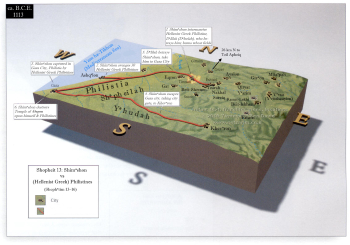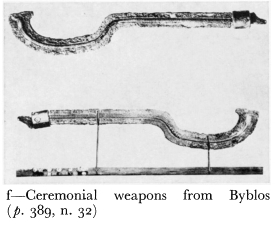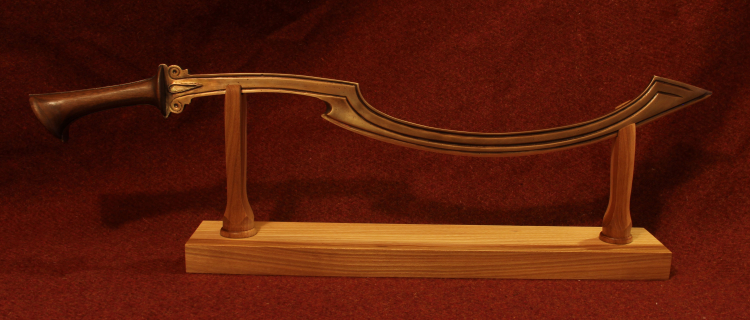
 |

 |
After Shi•mᵊsh•ōnꞋ![]() had burned many of the cornfields and olive groves of the Pᵊli•shᵊt•inꞋ with brushfires spread by the foxes he had unleashed, the Pᵊli•shᵊt•inꞋ marched inland, up into YᵊhūdꞋâh where they made camp, and spread-out menacingly by the village of ìÌÆçÄé.
had burned many of the cornfields and olive groves of the Pᵊli•shᵊt•inꞋ with brushfires spread by the foxes he had unleashed, the Pᵊli•shᵊt•inꞋ marched inland, up into YᵊhūdꞋâh where they made camp, and spread-out menacingly by the village of ìÌÆçÄé.![]()
So an ish YᵊhūdꞋâh, speaking on behalf of the village,![]() asked, “Why have you come up upon us?”
asked, “Why have you come up upon us?”
“We’ve come up to take Shi•mᵊsh•ōnꞋ![]() into custody,” the Pᵊli•shᵊt•inꞋ replied. “To do to him as he has done to us.”
into custody,” the Pᵊli•shᵊt•inꞋ replied. “To do to him as he has done to us.”
So 3,000 ish YᵊhūdꞋâh went down to the Cleft of the Rock at Ei•tâmꞋ, where they confronted Shi•mᵊsh•ōnꞋ![]() . “Hâ•lōꞋ, don’t you know that the Pᵊli•shᵊt•inꞋ rule over us? What you’ve done comes down on our heads.”
. “Hâ•lōꞋ, don’t you know that the Pᵊli•shᵊt•inꞋ rule over us? What you’ve done comes down on our heads.”
”As they did to me, so I did to them,” Shi•mᵊsh•ōnꞋ![]() replied.
replied.
”We’ve come down here to take you into custody,” they told him; “to hand you over to the Pᵊli•shᵊt•inꞋ.”
”Swear to me that you won’t harm me!” Shi•mᵊsh•ōnꞋ![]() demanded.
demanded.
”We won’t”, they replied, “but we’re absolutely going to take you into custody and hand you over to the Pᵊli•shᵊt•inꞋ. However, we absolutely will not put you to death.”
Then they tied him up with two![]() new braided-ropes and escorted him
new braided-ropes and escorted him![]() up from the Rock at Ei•tâmꞋ a couple of km north to ìÆçÄé, where the Pᵊli•shᵊt•inꞋ greeted his arrival with war-whoops.
up from the Rock at Ei•tâmꞋ a couple of km north to ìÆçÄé, where the Pᵊli•shᵊt•inꞋ greeted his arrival with war-whoops.![]()
 |
| Jawbone of an ass; either side resembling a weapon. |
 |
| Type II Sickle Sword, c. BCE 1900-1700 |
Then the RūꞋakh é‑‑ä erupted upon him and the braided-ropes became like linen-wicks after they’ve burned down—and his shackles dropped off from his arms. He spotted a nearby Pᵊli•shᵊt•inꞋ wearing a newly-forged ìÀçÄé-çÂîåÉø, jumped![]() his sword
his sword![]() —and attacked the thousand-strong ish crowd of Pᵊli•shᵊt•inꞋ with it; saying, “Armed áÌÄìÀçÄé-äÇçÂîåÉø, çÂîåÉø çÂîÉøÈúÈéÄí; áÌÄìÀçÄé-äÇçÂîåÉø, I attacked 1,000 Pᵊli•shᵊt•inꞋ.”
—and attacked the thousand-strong ish crowd of Pᵊli•shᵊt•inꞋ with it; saying, “Armed áÌÄìÀçÄé-äÇçÂîåÉø, çÂîåÉø çÂîÉøÈúÈéÄí; áÌÄìÀçÄé-äÇçÂîåÉø, I attacked 1,000 Pᵊli•shᵊt•inꞋ.”![]()
As soon as he finished speaking, he threw down the ìÀçÄé; and that place was named “øÈîÇú ìÆçÄé”.
 |
| Reproduction of Bronze Age LᵊkhiꞋ-Kha•mōrꞋ (”Jawbone Of An Ass”) “úÅÌì àÂôÅ÷ Khopesh Sword” |
Now he was dangerously dehydrated![]() and wa-yi•qᵊrâꞋ to é‑‑ä saying, “You have provided, by the hand of Your servant, this great ha-tᵊshū•âhꞋ. Yet, now I’m about to die of dehydration and fall into the hands of hâ-â•reil•imꞋ.
and wa-yi•qᵊrâꞋ to é‑‑ä saying, “You have provided, by the hand of Your servant, this great ha-tᵊshū•âhꞋ. Yet, now I’m about to die of dehydration and fall into the hands of hâ-â•reil•imꞋ.
But ël•ōh•imꞋ had cracked-open the mortar-like cavity that was in ìÌÆçÄé and water seeped out from it and he drank. Then his rūꞋakh returned and he was revivified. Ergo, qâr•âꞋ the name there “Ein ha-Qōr•eiꞋ, which is in ìÌÆçÄé ‘til this very day.
So Shi•mᵊsh•ōnꞋ![]() served as shō•pheitꞋ over Yi•sᵊr•â•eilꞋ, in the days of the Pᵊli•shᵊt•inꞋ, for 20 years.
served as shō•pheitꞋ over Yi•sᵊr•â•eilꞋ, in the days of the Pᵊli•shᵊt•inꞋ, for 20 years.

Optional parental preparation:
What is circumcision? Are females circumcised in Judaism? What is the difference between secular circumcision and Judaic circumcision? What is Judaic circumcision like for a male who is already secular-circumcised?
What is dehydration? Heat stroke? How to avoid? Remedy?
What is a mortar (as in mortar & pestle)?
15.09, ìÌÆçÄé — between Yᵊru•shâ•laꞋyim and Beit LëkhꞋëm. Fascinatingly, ìÆçÄé is first introduced to the narrative as this village name, before its mention (in its combinative form) as ìÀçÄé-çÂîåÉø.![]() This would suggest that the ìÀçÄé-çÂîåÉø was named after the village, rather than the reverse. Alternately (as most assume based on v. 17), the scribe, writing well after the events, may have simply recorded the name of the village as it was then familiar to readers— øÈîÇú ìÆçÄé.
This would suggest that the ìÀçÄé-çÂîåÉø was named after the village, rather than the reverse. Alternately (as most assume based on v. 17), the scribe, writing well after the events, may have simply recorded the name of the village as it was then familiar to readers— øÈîÇú ìÆçÄé. ![]()
15.13, 3,000 Yᵊhud•imꞋ escorted Shi•mᵊsh•ōnꞋ![]() to the Pᵊli•shᵊt•inꞋ — That means when they met the war-whooping Pᵊli•shᵊt•inꞋ, they outnumbered the Pᵊli•shᵊt•inꞋ 3,001 to 1,000! The text allows the inference that when Shi•mᵊsh•ōnꞋ
to the Pᵊli•shᵊt•inꞋ — That means when they met the war-whooping Pᵊli•shᵊt•inꞋ, they outnumbered the Pᵊli•shᵊt•inꞋ 3,001 to 1,000! The text allows the inference that when Shi•mᵊsh•ōnꞋ![]() jumped a newly-forged sword (or was handed a sword—or a pair of swords, and charged, he was almost certainly reinforced by his 3,000 Yᵊhud•imꞋ compatriots, who would also have been armed to escort Shi•mᵊsh•ōnꞋ
jumped a newly-forged sword (or was handed a sword—or a pair of swords, and charged, he was almost certainly reinforced by his 3,000 Yᵊhud•imꞋ compatriots, who would also have been armed to escort Shi•mᵊsh•ōnꞋ![]() .
.
Further, the 3,000 Yᵊhud•imꞋ likely aided Shi•mᵊsh•ōnꞋ![]() by binding him with treated or rigged rope that would drop off when Shi•mᵊsh•ōnꞋ
by binding him with treated or rigged rope that would drop off when Shi•mᵊsh•ōnꞋ![]() needed..
needed.. ![]()
Questions you might anticipate that your child might raise and be prepared to discuss:
What does “menacingly” mean?
What does it mean to take someone into custody?
What is a braided cord or rope?
What does it mean to “escort” someone?
What is an eruption? What does it mean to “erupt”?
What is the burnt part of a candle wick like?
![]()
 |
 |